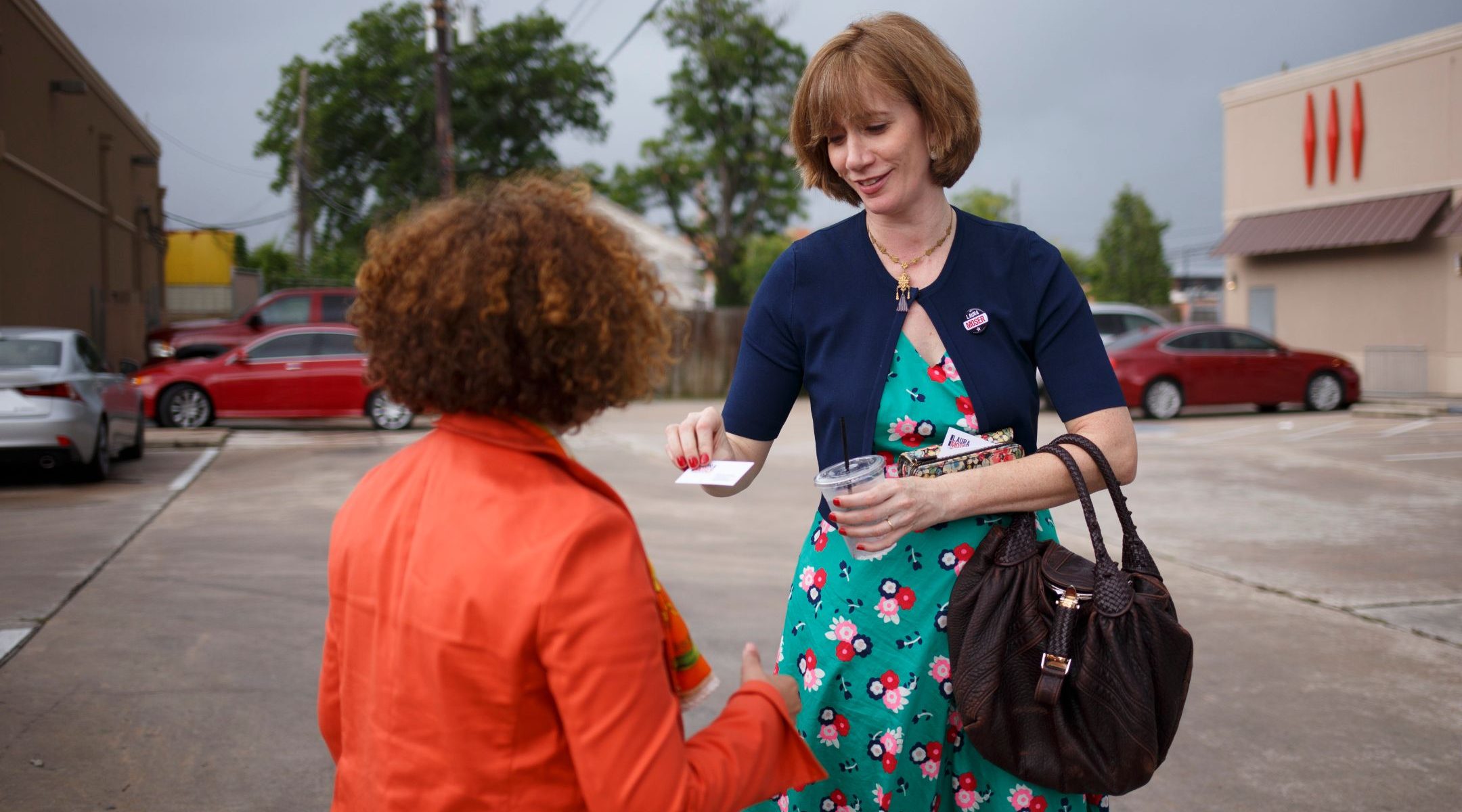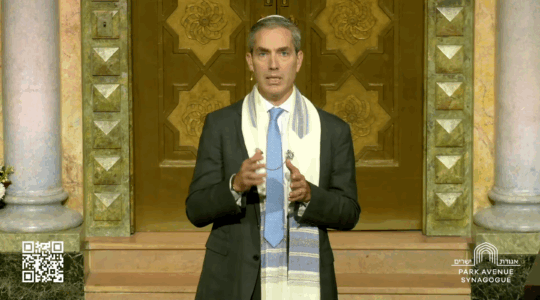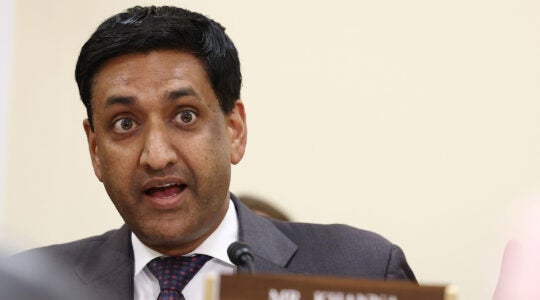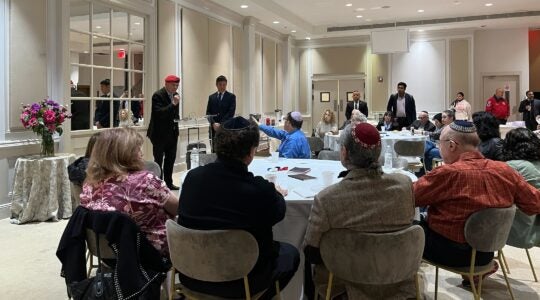(JTA) — “That is not an authentic burrito,” says Laura Moser, a Texas Jew speaking from her apartment in Berlin, where she has sought refuge from being, well, a Texas Jew.
A delivery service had just dropped off her dinner and Moser, who was born and raised in Houston, knows from Tex-Mex. But she also knows from Berlin: Her grandfather’s law office, the one he left in 1938 as he fled the country he had loved and served, is just a walk away.
A 14-minute walk to be precise, according to a remarkable essay Moser just published in the New Yorker called “My grandfather fled the Nazis. I moved to his old neighborhood.”
“Cracks had begun to appear in the certainties of my American childhood,” she writes. “I’d come to see that places could change, for better and for worse.”
Moser, 43, writes like a switchblade stained red with regret. In precise, slashing strokes she chronicles her trajectory from starring in one of the most-watched congressional races in the United States to an apartment in Berlin where that most Jewish of fears, being found out as the other, still haunts her.
“I was no longer sure that my country loved me back, or what that country even was anymore,” she writes.
It was a stunning realization, coming after she had made her grandfather’s story, her own story of Jewish salvation, central to her campaign.
“I had wanted to help save the country that had saved my grandfather, the country that, in spite of everything, I still loved, and without which I would not exist,” she writes.
On the phone, speaking through the clatter of memory and her hungry offspring, within seconds she lurches from #takeoutfail to her American Jewish journey from belonging to alienation.
“Burritos,” she guffaws, “with no, like, guacamole or salsa, you know,” and then, done with denouncing German Tex-Mex, she returns to her American identity.
“I don’t know what changed, but there’s something like just being slightly on the outside, but liking it and then suddenly just being like, not liking it, but not wanting to be on … I don’t know.”
Moser peppers an hourlong conversation with “I don’t know” about 25 times — which is fine because the point is, she doesn’t know. She doesn’t know where she belongs, she doesn’t know whether she believes what she once believed, she doesn’t know if America is safe, even though he’s gone, Donald Trump, the man who launched her briefly into the stratosphere because she chose to resist him, until she was burned out of the sky, she says, by nativism.
“Generational trauma trickles down, and I just felt it in me when I ran [for office]. This is what it’s like to be told ‘a decision was made,’ this is when you find out that you’re not really one of them,” she says. “Did I want to be one of them? I don’t know, but I thought I was. And here,” in Berlin, “I’m not going to be one of them.”

In this undated photo from 2020, Laura Moser’s son and daughter watch a ball in a canal in Utrecht, the Netherlands. Moser left the United States following an unsuccessful run for Congress. (Courtesy of Moser)
In Berlin, she is relieved from deciding whether she wants to be inside, one of them. She is not one of them.
Moser’s first brush with fame, in 2015, was a picture-perfect American Jewish moment: The White House photographer took a picture of her daughter, then 2, melting down at the White House seder, face down, pigtails up, on a pricey-looking rug.
President Barack Obama appears to be delighted, smiling and gesturing toward the girl in a “this is what a 2-year-old will do at a seder” kind of way as if he had hosted seders his entire life instead of just since he was president. Laura Moser projects elegance and mortification: She is smiling at Michelle Obama, one hand relaxed over her torso, the other out of the first lady’s line of sight stiff with tension, pressing against the fabric of her dress.
Moser was a freelance writer then and raising her daughter and son while her husband, Arun Chaudhary, was leading a communications firm. From 2009 to 2011, Chaudhary had been the first-ever White House videographer, and the couple had campaigned for Obama in 2008.
Eighteen months after that seder, Moser wrote in 2017 in Vogue, she found herself “in the front lines of the Resistance.” The morning after the 2016 presidential election, she was moved to act — not just because of the prospect of four years of Donald Trump, but of Democrats on social media shvitzing despair and disarray.
Moser launched a texting service called Daily Action that directed recipients to a specific action they could take each day to push back against the Trump agenda. It exploded, endorsed by celebrities, and scored successes, helping to stop the then-Republican-led U.S. House of Representatives from watering down ethics oversight.
Within months the service had hundreds of thousands of followers and friends were asking her about a political future.
It became real when she realized that the Houston-area district where she grew up was one of 23 in the nation that had voted for Hillary Clinton for president and a Republican incumbent for Congress. Moreover, the incumbent, John Culberson, was tainted by scandal.
“It seemed like I’m in this weird position where I have proven organizational abilities, I am a woman, and it really is offensive to me that a man who has no respect for women was elected,” she told the Jewish Telegraphic Agency in 2017, months after she launched her campaign.
Moser lost in the Democratic primary to Lizzie Fletcher, a lawyer, and Fletcher went on to defeat Culberson.
From a distance, Moser’s time in the limelight looked like a fun ride even in defeat.
At least she looked like she was having fun in a 2017 photo in Vogue, in a navy puff sleeve sweater over a blue and white geometric print A-line skirt, her grin, echoed precisely by her 4-year-old daughter in the foreground, broadcasting road-trip joy, the launch of a grand adventure.
What’s more, Moser discovered that she liked the rigors of campaigning.
“I felt pretty good at it — at telling my story, connecting with strangers, conveying what was at stake,” she writes in the New Yorker. “I ran on a progressive platform in a right-leaning district, supporting Medicare for All, stronger labor unions, and Day One impeachment.”
In 2017, she marveled to the JTA at how her candidacy seemed to have lit a nationwide fire.
“I have donations from 48 states, and today I got a $10 donation from someone in Hawaii — that makes it 49,” she said in August of that year.
But up close it got ugly, especially as it was clear in early 2018 that Moser was catching up to Fletcher, whom the establishment preferred as a moderate likelier to win in a swing district. In a move that was highly unusual for a race without a Democratic incumbent, the Democratic Congressional Campaign Committee, or DCCC, ran an ad against Moser, calling her a “Washington insider.”
That outraged Our Revolution, the political action committee founded out of the remnants of Bernie Sanders’ 2016 presidential campaign, and it endorsed Moser. Backing came as well from other corners of the left — howls of outrage on her behalf in The Intercept and Vox. The actress and activist Alyssa Milano declared her support. It didn’t help: Moser drew just a third of the vote in the May 2018 primary.
The Democratic Congressional Campaign Committee said at the time that it was protecting a likely gain for Democrats, one that would help return the party to a majority in the House.
“When there’s a truly disqualified general election candidate that would eliminate our ability to flip a district blue, that’s a time when it becomes necessary to get involved in these primaries,” a DCCC spokeswoman said at the time.
Moser had returned to Houston to run, but she and Fletcher, a corporate lawyer, had much in common, having attended the same private school, St. John’s. They traveled in circles close enough that in a 1992 photo of a pro-Planned Parenthood protest, Fletcher and Moser’s brother, Benjamin, have their arms draped around each other. (Fletcher cropped Benjamin Moser from the photo and used it to tout her reproductive rights bona fides during her campaign.)
What profoundly unsettled Moser was that she felt the DCCC was not just weaponizing her Washington years but her Jewishness. There were whispers, she says, of campaigners for other candidates telling voters that Moser’s story of her grandfather’s flight from Berlin, a story she told to stake her claim as an American who wanted to save her country, was a lie. She says she was told there were neighborhoods in her district that would never elect a Jew.
And then there was the essay that circulated during the campaign, written when she was 22, and appearing in the iconoclastic (and now defunct) weekly New York Press.
It is an unfiltered rant called “The Jesus Orgy.” She attends a service at an African church in London, and in 700 words jams together her feelings of awe and fear in the face of the fervid faith her hosts embrace, her longing for a spirituality, her unmooredness.
“In this postgraduate abyss, I am becoming increasingly anxious for some spiritual structure,” she writes in the essay. “I miss institutional affiliations already. Yesterday afternoon, I received a group e-mail wishing me l’shanah tovah, and I realized that Rosh Hashanah had come and gone without my even knowing it.”
It’s not clear who uncovered and distributed the essay. Unlike her output for Vogue, where she had attacked the DCCC in 2017 for not filtering out anti-abortion Democrats, or for the Washingtonian, in 2018 one really had to search for the New York Press piece from 1999 to know it existed. Yet somehow it turned up quoted on social media.
An anguished, ancient contemplation about feeling alienated and Jewish and far from home was turned against her.
“Here’s Laura’s writing about attending a black Christian church as a guest,” a Democratic activist with 11,000 followers said in April of that year on Twitter, calling Moser “ableist, elitist and racist.”
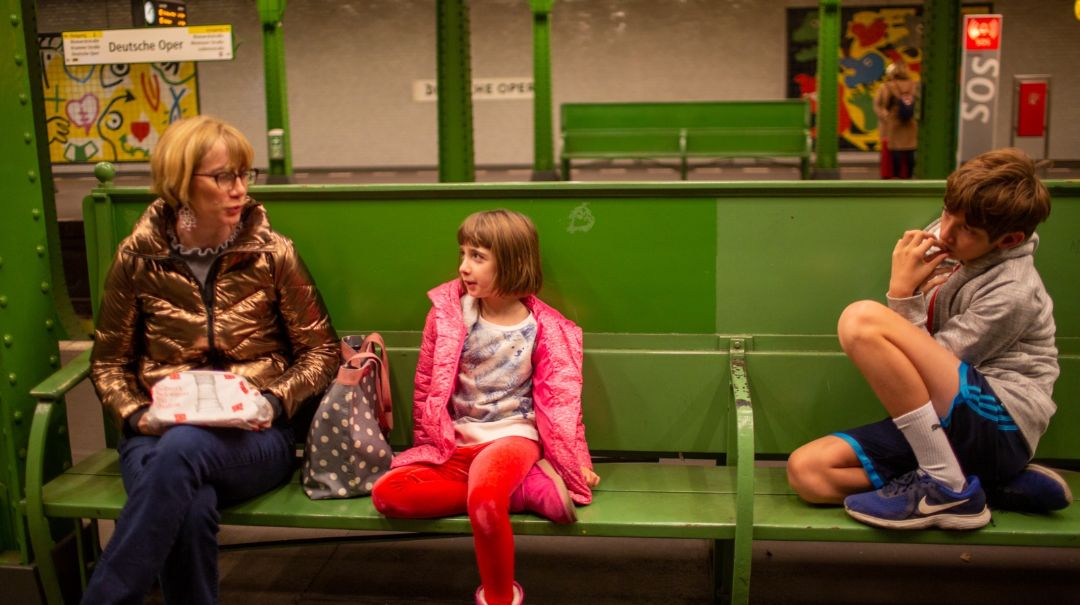
Laura Moser and her children on a train in Berlin, Nov. 25, 2019. The family was exploring a move it would eventually make. (Courtesy Laura Moser)
Moser says she suddenly understood why her grandfather, a World War I combat veteran, refused to believe until it was almost too late that he would be unsafe.
“I just realized how much of an other I was, I guess, for the first time, because this thing, this identity I’d taken pride in — it made me take more pride in it, in a way,” she said last week. “I really felt a duty to America, and then afterwards I was like, I don’t know, like, I feel sort of stateless.”
Her alienation was compounded by what happened after she criticized Rep. Ilhan Omar, the Minnesota Democrat, for saying in 2019 on Twitter that the reason Israel is favored in Congress is “all about the Benjamins.” Moser made clear she otherwise admired Omar, and believed that in some instances antisemitism is weaponized against Israel critics, but nonetheless was attacked, she said, as a “neocon.”
Moser’s critics came from the New York area, an area where Jews are preeminent and, she said, less attuned to the tropes that can stigmatize Jews without naming them.
“Why don’t you try running for Congress in, like, the middle of America sometime and then tell me that coded things can’t sometimes be antisemitic,” she said.
She never had the right. The center shunned her, too. Now she was losing the left.
There were other factors in her decision to use the German citizenship that she had acquired, at her brother’s behest, when she was barely out of her teens: an illness her husband is suffering, she wrote in the New Yorker, would be “ruinous” in the American system. Her brother lives in the Netherlands.
But above all is the clarity she has found in the city her grandfather fled, one that comes with a gut punch.
“The nastiness of it just really made me feel like a stranger in my own country for the first time in my life,” she says in the interview. “And so, at least in Europe, you know. You know to look over your shoulder.”
In the New Yorker article, Moser says German Jews tell her that the hatred has never abated. She says she is not pulled toward Israel.
“My, sort of, beliefs and values don’t intersect with what’s happened in Israel for quite a while, you know, in terms of treating the Palestinian people with dignity,” she says. “I identify with Israelis more than with other people. But I’m American. An American Jew.”
Wait, a reporter stops her: She is gravitating, after publishing a self-exorcism, back to being an American Jew?
“You know, of course I’m American, like, I’m 43,” she says. “But, but maybe it’s not — just because it’s like, the easiest thing, maybe it’s not the best thing.”
Like Moser, her family is suspended in that void, between America and Europe.
Her husband makes a living advising Europeans on running American-style political campaigns.
Her 12-year-old son is taking online bar mitzvah classes with a tutor in New Jersey, and is attending an American school. Her daughter, 8, is attending a German school and has made a best friend, but Moser can’t get the other girl’s mother to commit to play dates.
“I don’t even want the mom to come over,” she says. “I want the daughter to be dropped off, but it was just sort of like if I were like a German, that would have been no problem.”
Moser tries to describe the phenomenon to her own German teacher. The class had learned the distinction between “verschlossen,” sealed shut, and “geschlossen,” closed but not locked. Germans, Moser told her teacher, seemed a little “geschlossen,” difficult to reach.
The teacher explains that geschlossen applies only to doors. The only word that applied to humans was “verschlossen,” unreachable.
Now, Moser thinks, a German school may not be right for her daughter.
“So,” she says, “I think I’m going to send her to [the American school] next year.”
JTA has documented Jewish history in real-time for over a century. Keep our journalism strong by joining us in supporting independent, award-winning reporting.
